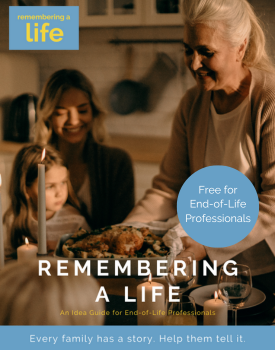
Grief and Self-care
Grief
Grief is not just a feeling. It is dozens of feelings—sometimes contradictory feelings—that are a response to losing someone you love. Grief is not just an emotion either. Grief is a physical response with ailments, aches, and fatigue. It is an intellectual experience that asks a lot of hard questions about life, your relationship, what happened, and the future. Grief is also a spiritual experience that asks us the meaning and purpose of this suffering.
Because grief is such a complex experience that is different for every person, it is important to find support and take good care of your emotional and physical needs. While grief is a normal part of being human, it can further complicate your life if you don’t take care of your feelings and body.
Your Grief Journey
The death of a loved one is one of life's most difficult experiences, and along your grief journey, you will encounter some difficult and sad moments, as well as some pleasant moments, as you reflect on the good times and experiences you and your loved one shared. Those feelings are a normal part of the grieving process.
Your grief journey is yours alone. No one will grieve the loss of a loved one exactly the way you do – and that's okay. As you begin your journey, do so with no expectations regarding the path you'll take, which might lead you to places you least expect. Instead, and to the best of your ability, embrace what the journey has to offer because you might discover new things about your loved one and, more importantly, even about yourself.
Feelings and Experiences You May Have
Your grief journey will be difficult at times, but along the way, you will also discover opportunities to honor your loved one in unique and beautiful ways in tribute to the impact he or she had on the lives of others, and the indelible mark your loved one left on the world.
The death of a loved one is a stressful life event, and the resulting grief can trigger many uncomfortable feelings, thoughts and physical sensations. These are normal and necessary responses to the loss of a loved one, however, and might include:
Feelings/emotions: Anger, anxiety, blame, confusion, denial, relief, depression, fear, guilt, irritability, loneliness, numbness, sadness, shock, or yearning
Thoughts: Confusion, difficulty concentrating, increased mental "noise," disbelief, or preoccupation with your loss
Physical sensations: Dizziness, fast heartbeat, fatigue, headaches, hyperventilating, nausea or upset stomach, shortness of breath, tightness or heaviness in the throat or chest, or weight gain or loss
In order to understand and cope with the symptoms of grief during your unique healing process, it is important for you to practice proper self-care. Consider these self-care guidelines to help you better cope with your grief:
Eat well. Eating nutritious food is always important, but particularly while grieving, so try to ensure you're eating a balanced diet. In addition, cooking or baking can provide therapeutic and aroma-therapeutic benefits. If you're now cooking for one, the transition might prove difficult so consider cooking several meals in advance and storing them to eat throughout the week. You might want to invite a friend or family member to join you for a meal, if you feel up to it. (During the pandemic, consider sharing a meal via Zoom or Facetime.)
Exercise. Even a short walk or some stretching can provide benefits. If you're able to do more, then consider going for a run or a bike ride. Yoga can prove a peaceful and contemplative way to both exercise and relax.
Sleep well. Getting a good night's sleep is one of the best things you can do for your total well-being. If you think you might be sleeping too little, not getting quality sleep or sleeping too much, consider speaking with a medical professional.
Spend time with others. Arrange to do things with family members or friends, join a club or community organization, or spend time with people at your local faith-based organization. (During the pandemic, make the most of virtual communications and experiences to stay connected.)
Seek support. Explore options for support groups and other resources in your community. Sharing your story with others dealing with a loss can prove beneficial. If you feel you are really struggling with your grief, seeking additional support from a grief professional might be helpful. Not sure where to start? Visit Find Support for a list of resources.
Express your feelings. Talk about how you're feeling with someone you trust who can listen without judgment. You might also seek a creative way to let your feelings out, such as art, music, movement or writing in a journal.
Maintain a routine. Get back into your normal routine as soon as you can. Try to keep up with your daily tasks so you don’t get overwhelmed.
Engage in activities and hobbies. If you feel up to it, try to engage in a hobby or activity that brings you satisfaction or joy. If you don't have any hobbies, this may be the perfect time to find one.
Avoid alcohol. Drinking alcohol can contribute to feelings of depression and increase your feelings of loss and sadness. Alcohol can also interfere with the quality of your sleep and thwart your efforts to eat nutritiously.
Avoid major life decisions. It takes time to adjust to a loss and to begin thinking and feeling clearly. Making impulsive decisions when you're grieving can increase your stress, so try to wait a year before making big changes, such as moving, changing your job or career, etc.
Most importantly, allow yourself to grieve. Give yourself permission to cry, to feel numb or angry... to simply feel however you feel. Avoiding self-judgment and "shoulding" – "I should be feeling this..." or "I shouldn't be thinking that," etc. – will help you meaningfully honor your loved one as you also process the loss and heal during your unique grief experience.
Finally, many grievers wonder how long they will grieve or when they will be "over it." For most people, the immediate pain of loss will gradually and eventually subside over several months. However, when a loss has had a major impact on your daily life it is not uncommon to feel the aftershock of that loss for the rest of your life.
If you feel a loss prevents you from experiencing joy or pleasure again, completing daily tasks or eventually returning to a normal routine, then consider seeking help from a doctor or grief professional.
